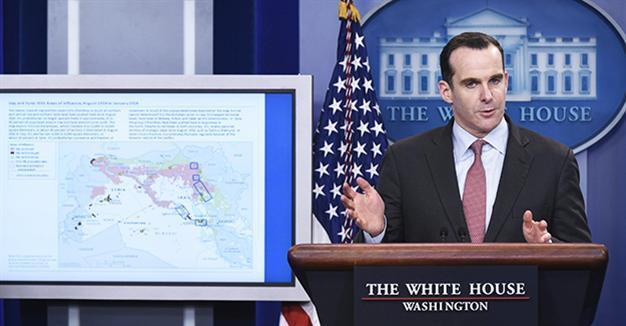US anti-ISIL chief: ‘US can’t succeed without Turkey’
WASHINGTON

Brett McGurk, Special Presidential Envoy for the Global Coalition to Counter ISIL, speaks in the Brady Briefing Room of the White House on February 23, 2016 at the White House in Washington, DC. AFP Photo
President Barack Obama’s special envoy to the global counter-Islamic State of Iraq and the Levant (ISIL) coalition stressed Turkey’s important role in the fight against ISIL, stating it was impossible for the United States to “succeed without Turkey,” during a White House press briefing on Feb. 23.“We have to work on this closely together. We can’t succeed in this without Turkey,” U.S. Envoy Brett McGurk said in response to a remarks questioning Turkey’s role in the cessation of hostilities in Syria, in regards to its shelling of People’s Protection Units (YPG) targets across its border.
Leaving questions about Turkey’s demands from the U.S. to choose between Turkey and the YPG unanswered, McGurk stressed that his meeting with the YPG in Kobane late January was aimed at achieving “political cohesiveness.”
McGurk stressed that Turkish cooperation has “made a real difference” on the border and that the close partnership between Turkey and the U.S. is set to continue.
Meanwhile, Pentagon Press Secretary Peter Cook said Feb. 23 that Turkey’s shelling of YPG forces in northern Syria would be an “ongoing topic of conversation” between the two countries.
“We’ll continue to work closely with the Turks in the fight against ISIL and, of course, their own security situation. It remains an ongoing topic of conversation,” said Cook during a Department of Defense Press Briefing.
“We remain engaged with Turkey about these issues. I understand the sensitivities of the border situation there. But our focus remains ISIL and that remains the focus of the coalition,” Cook added.
Russian air campaign “complicating” situation at Turkey’s border
McGurk also commented on the impact of Russia’s air campaign in northern Syria, saying Moscow’s military efforts “dramatically complicated the picture” by creating a humanitarian crisis.
The envoy denied Russian claims that the main supply corridor from Turkey to Aleppo was used to transfer weapons, calling it instead passageway for humanitarian aid.
“The Russians say that’s to cut off the weapons corridor; it’s actually primarily a humanitarian corridor. And this has really created a real humanitarian crisis. It’s also completely shaken up the situation north of there to the Turkish border,” he said.
Turkey’s border efforts applauded by envoy
The U.S. envoy also praised Turkey’s efforts to seal off its border with Syria to stem the flow of foreign fighters, saying Turkey has “done a very good job” so far.
Defining Turkey’s 98-kilometer border strip shared with ISIL as the latter’s “last remaining outlet” to the outside world, U.S. Envoy Brett McGurk, praised Turkey’s efforts in cutting off ISIL.
“Turkey has done a very good job of beginning to close down that border,” he said, adding the issue was one of the topics of discussion in an 80-minute phone call between Obama and Turkish President Recep Tayyip Erdoğan on Feb. 19.
McGurk highlighted the importance of halting the flow of jihadists into Syria, explaining that some 35,000 foreign fighters from 120 countries have flocked to the country since the beginning of the crisis – an unmatched phenomenon to date.
“We want to make sure that foreign fighters cannot get into Syria, and once they get into Syria, they’ll never get out,” he said, stressing that in addition to Turkish efforts to seal its borders, its increased cooperation and intelligence-sharing between source countries has been essential.
Turkish General Staff has announced on Feb. 22 that a total of 1,220 ISIL militants were caught on the Syrian border over the past 14 months, while the figure stood at 259 since the beginning of 2016.
The number of apprehended ISIL militants in February has risen more than fivefold compared to last year’s figure, due to measures taken in terms of security systems across the border.
The information also added ISIL militants were largely caught in the area surrounding and within the Elbeyli district of the southeastern border town of Kilis.
















